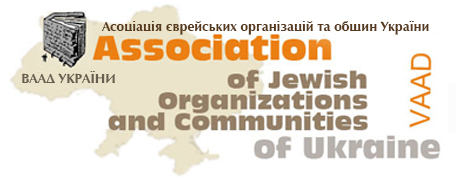Ukrainian Jews Protest Statements by Russian MFA
On April 13, the Minister of Foreign Affairs of the Russian Federation made a statement through the ITAR-TASS state news agency. The statement, in particular, included the following: “The situation in South-Eastern Ukraine is developing in a highly dangerous manner. The Kyiv authorities, self-proclaimed after a coup, have made a decision to use force to suppress the people’s protests that were a reaction to a complete disregard for the legal interests of the residents of south-eastern regions, direct threats and violence towards all who disagree with the prevalence of national-radicals and chauvinist, Russophobic, and anti-Semitic acts of the coalition now reigning in Kyiv.”
Well-armed separatist groups are acting in Ukraine right now, and they have seized administrative buildings and terrorize the civil populace. Their actions are systematic and well-coordinated; they are well-prepared and have uniforms and weaponry that force an assumption: these people are representatives of Russian special ops groups. There are many established facts of Russian citizens taking part in these events. Moreover, Russian officers who participated in Russian aggression towards Georgia in 2008 have already been identified among the so-called “activists” of the terrorist groups. Thus, it can be said with all certainty that the Russian military expansion into Ukraine that began with the occupation of Crimea continues in Ukrainian eastern and southern regions.
The Russian Ministry of Foreign affairs calls the large-scale act of aggression that is unfolding before our very eyes “protests that are a reaction to the violence towards all those who do not agree with the anti-Semitic acts of the coalition reigning in Kyiv.”
The Jewish communities and organizations of Ukraine condemn in the strongest terms all attempts to justify military aggression through speculating on the topic of anti-Semitism.
A month and a half ago, Jewish leaders and activists wrote a letter to Vladimir Putin, when manipulations using “the Jewish question” went into systematic use by the Kremlin as a basis of its intrusion into Ukrainian foreign affairs. The letter reads: “Unfortunately, we must admit that in recent days stability in our country has been threatened. And this threat is coming from the Russian government, namely – from you personally. It is your policy of inciting separatism and crude pressure placed on Ukraine that threatens us and all Ukrainian people, including those who live in Crimea and the Ukrainian South-East. South-eastern Ukrainians will soon see that for themselves. Vladimir Vladimirovich, we [....] we do not wish to be “defended” by sundering Ukraine and annexing its territory. We decisively call for you not to intervene in internal Ukrainian affairs.
The Deputy Minister of Foreign Affairs of the Russian Federation Mikhail Bogdanov has attempted to find support among Russian Jewish organizations, claiming that Ukrainian Jews need the kind of support mentioned above. However, a resolution has been adopted at the session of the World Jewish Congress Executive Committee that took place two weeks ago in Paris, which read: “The WJC Executive Committee [...] recognizes the new Ukrainian government’s assurances and actions, that Jews and Jewish life in Ukraine will be protected,” and “urges all governments, media and non-governmental organizations and their representatives not to cause this complex situation to deteriorate by making unfounded accusations, or giving exaggerated accounts, of the situation of the Ukrainian Jewish population.” Representatives of Jewish communities around the world voted for this resolution, including the Russian delegation.
The Jewish communities and organizations of Ukraine outright reject the references to a mythical “anti-Semitism” that are in use by the official Kremlin’s speculative rhetoric, aimed to justify the intrusion into Ukrainian internal affairs. The Jewish community warns the Russian Ministry of Foreign Affairs not to use “the Jewish question” for the propaganda supplying military aggression.
Jewish Council of Ukraine
President Iliya Levitas
Jewish Confederation of Ukraine
First Vice President Alexander Suslensky
Vice President Andrei Adamovskiy
Center for the History and Culture of Eastern European Jewry
Director Leonid Finberg
Ukrainian Center for Holocaust Studies
Director Anatoliy Podolsky
Zionist Federation of Ukraine
Chairman Igor Kuperberg
Religious Association of Progressive Judaism in Ukraine
President Alexander Zlotnik
Association of Jewish Communities and Organizations (VAAD) Ukraine – Chairman Josef Zissels
Institute of Judaica, Kiev - Director Julia Smilianskaya
Jewish Council of Ukraine -
ice President Semen Belman
Chernigov regional Jewish community -
Chairman Semen Belman
Union of Jewish Religious Communities of Ukraine
Executive Director Eugene Ziskind
Ukrainian Union of Jewish Students
President Viktoria Godik
Ukraine Representative of the World Council of Masorti Synagogues
Rabbi Reuven Stamov



.png)

